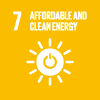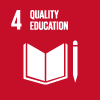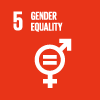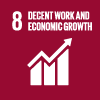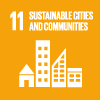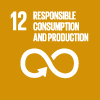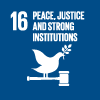| Materiality(E) | Policy | Status/Example |
|---|---|---|
| Reducing environmental impact |
・Consider and implement environment-friendly measures, etc. ・Use environment-friendly products, consumables and services, etc. ・Commitment to reduction of paper media ・Disclosure of information pertaining to climate change response and initiatives |
・Develop a compliance program, a specific and practical program designed to meet compliance requirements ・Carry out risk management activities at each division throughout the year ・Adopt alternative materials to replace paper and plastic ・Promotion of environment-friendly procurement through establishment of “Green Procurement Standards” ・Establishment of a framework in line with climate action standards and disclosure support regarding the initiatives making use of TCFD recommendations |
| Relevant SDG Targets |
7.3By 2030, double the global rate of improvement in energy efficiency
13.1
Strengthen resilience and adaptive capacity to climate-related hazards and natural disasters in all countries
13.3 Improve education, awareness-raising and human and institutional capacity on climate change mitigation, adaptation, impact reduction and early warning |
|
| Materiality(S) | Policy | Status/Example |
| Human capital development as a group of professionals |
・Implement human capital management that is based on respect for human rights and that takes into account the perspectives of diversity, equity, and inclusion ・Promote human resource strategy that indicates the requirements of desirable resources and facilitate development ・Improve literacy pertaining to sustainability and ESG investment ・Commitment to health and well-being of each employee ・Deployment of measures based on Group KPIs (work-style reform, promotion of diversity) |
・Disclosure of key employee data to present our human resources strategy and status of efforts on employee health and well-being (ratio of female employees, number of female directors and managers, turnover ratio, stress check participation ratio, etc.) ・Support acquisition of business knowledge, skills, qualifications, and implement various trainings ・Promote career development through periodic performance evaluation/feedback ・Periodic Health Committee ・Promotion of the New Work Style Project ・Introduction of various support systems leveraging on Tokyu Group membership, etc. |
| Contribution to the region |
・Enhance cooperation with local community |
・Participation and cooperation in community activities |
| Relevant SDG Targets |
3.dStrengthen the capacity of all countries, in particular developing countries, for early warning, risk reduction and management of national and global health risks
4.4
By 2030, substantially increase the number of youth and adults who have relevant skills, including technical and vocational skills, for employment, decent jobs and entrepreneurship
4.7 By 2030, ensure that all learners acquire the knowledge and skills needed to promote sustainable development, including, among others, through education for sustainable development and sustainable lifestyles, human rights, gender equality, promotion of a culture of peace and non-violence, global citizenship and appreciation of cultural diversity and of culture’s contribution to sustainable development 5.5Ensure women’s full and effective participation and equal opportunities for leadership at all levels of decision-making in political, economic and public life
8.8Protect labour rights and promote safe and secure working environments for all workers, including migrant workers, in particular women migrants, and those in precarious employment.
11.3By 2030, enhance inclusive and sustainable urbanization and capacity for participatory, integrated and sustainable human settlement planning and management in all countries.
|
|
| Materiality(G) | Policy | Status/Example |
| Management framework corresponding to multifaceted social demand towards sustainable society |
・Enhance governance through compliance and risk management ・Establish framework for promoting implementation of the Sustainability Policy ・Implement human capital management and maintain a resilient management framework ・Enforce customer-first business operation ・Information disclosure to promote understanding from all stakeholders |
・Develop a compliance program, a specific and practical program designed to meet compliance requirements ・Carry out risk management activities at each division throughout the year ・Disclose necessary information and operate the Sustainability Promotion Council in accordance with the Sustainability Policy ・Establish various rules, etc. and implement training which attempt to respond to multifaceted issues including respect for human rights ・Establish a framework for management of the overall supply chain |
| Relevant SDG Targets |
12.8By 2030, ensure that people everywhere have the relevant information and awareness for sustainable development and lifestyles in harmony with nature
16.7Ensure responsive, inclusive, participatory and representative decision-making at all levels
|
|
Efforts by Each REIT
Efforts by each REIT are disclosed on their respective websites.
■The Company is making following efforts to reduce environmental impact:
・The Company, as a member of Tokyu Fudosan Holdings Group, shares “Sustainable Procurement Policy”, published on January 31, 2020, and works on environmental measures including “combatting climate change”. The purpose is to collaborate
and cooperate with all stakeholders including suppliers by gaining understanding of the policy.
Tokyu Fudosan Holdings “Sustainable Procurement Policy” https://tokyu-fudosan-hd-csr.disclosure.site/en/themes/29
Based on the Group's Sustainable Procurement Policy, the Company has established the "Basic Policy on Sustainable Procurement" and "Green Procurement Standards" in order to implement the Company’s Sustainability Policy more specifically.
This standard broadly indicates to suppliers that environment-friendly procurement is to be carried out, and in cooperation with each other, the Company works together to promote more sophisticated efforts based on the Sustainability
Policy. In addition, the scope of application of this standard is direct or indirect transactions related to products, services, raw materials, and design/construction procured by the Company and all investment corporations entrusted
to the Company.
・Since April 2022, the Company has been offering label-less beverages in the office to visitors and meeting attendees. The use of label-less bottles helps reduce plastic resin consumption and saves the trouble of removing the labels before discarding the bottles. Purchasing such beverages from suppliers committed to social and environmental sustainability is also part of our efforts to raise awareness of the need to address environmental problems through everyday consumption activities.

・We run a pilot reuse event to help reduce waste and CO2 emissions. Employees bring in items they no longer need at home and pass them on to colleagues who can give these items a second life. Through the event, we hope the employees will realize that they can easily become a part of the solution to environmental issues and take proactive action. It is also an opportunity to enhance communication between our employees.

■Climate Action
・The Company believes that climate change is a critical issue that has a significant impact on our business activities and those of the investment corporations that entrust asset management to us. In January 2022, we announced our support for the recommendations of the Task Force on Climate-related Financial Disclosures (TCFD). We also established our “climate action standards,” setting out the framework and basic policy for climate action as well as procedures for risk and opportunity management and related metrics and targets. These measures are part of the Company’s efforts to ensure that the investment corporations disclose information appropriately.
Human capital development as a group of professionals
As a group of professionals in real estate management, we believe human resource development is crucial for providing high quality real estate investment management services to maximize unitholder value and promote our human resource
strategy.
In particular, we present a qualitative standard of requirements for desirable resources to encourage each employee to align their development with these values, and conduct resource hiring/development/utilization based on
the evaluation system that aims to generate corporate culture that leads to reform and new value creation.
To enable each employee to fully realize their abilities and develop their careers, we appoint the right person to right
positions with interviews conducted with all employees by Human Resources and our career development application system.
Through these efforts, we aim to provide physically and mentally healthy and stable life for each employee.
To secure necessary resources, we accept secondment supported by the sponsor group.
Refer to the “Key Employee Data” below regarding secondees.
We publish our data and initiative statuses related to sustainability activities including “Key Employee Data” and “Status of Work-Style Reform and Diversity Promotion” as shown below on a voluntary basis, not as a statutory
requirement.
■Key Employee Data
| Item | As of April 2021 |
As of April 2022 |
As of April 2023 |
As of April 2024 |
As of April 2025 |
KPI target for FY2030 |
Tokyu Fudosan Holdings Group FY2030 KPI(Note 7) |
|---|---|---|---|---|---|---|---|
| Number of Employees (Note 1) |
106 | 103 | 105 | 109 | 112 | ||
| Male | 59 | 60 | 61 | 62 | 61 | ||
| Female | 47 | 43 | 44 | 47 | 51 | ||
|
Of which age group distribution Under 30 30 ~ Under 50 50 and Over 50 |
18.9% 61.3% 19.8% |
16.5% 62.1% 21.4% |
19.0% 61.0% 20.0% |
18.3% 63.4% 18.3% |
17.9% 67.0% 15.2% |
||
| Of which full-time | 53 | 56 | 68 | 72 | 78 | ||
| Male | 30 | 32 | 38 | 42 | 44 | ||
| Female | 23 | 24 | 30 | 30 | 34 | ||
| Of which contract employees | 14 | 13 | 9 | 10 | 10 | ||
| Male | 1 | 1 | 1 | 1 | 2 | ||
| Female | 13 | 12 | 8 | 9 | 8 | ||
| Of which contract employees from converted temporary employees |
1 | 1 | 2 | 2 | 1 | ||
| Of which seconded (Note 2) |
39 | 34 | 28 | 27 | 24 | ||
| Male | 28 | 27 | 22 | 19 | 15 | ||
| Female | 11 | 7 | 6 | 8 | 9 | ||
| Ratio of female employees | 44.3% | 42.0% | 41.9% | 43.1% | 45.5% | 40.0% | |
| (Reference) Temporary employees | 8 | 9 | 7 | 6 | 8 | ||
| Male | 2 | 3 | 4 | 4 | 4 | ||
| Female | 6 | 6 | 3 | 2 | 4 | ||
| New Hire (Note 3) |
6 | 6 | 13 | 7 | 8 | ||
| Male | 5 | 5 | 8 | 6 | 6 | ||
| Female | 1 | 1 | 5 | 1 | 2 | ||
| Of which full-time employees from converted contract employees |
0 | 1 | 4 | 0 | 2 | ||
| Number of Directors (Note 4) |
4 | 4 | 4 | 4 | 4 | ||
| Of which female directors | 0 | 2 | 2 | 1 | 0 | ||
| Ratio of female directors | 0% | 50.0% | 50.0% | 25.0% | 0.0% | ||
| Of which age group distribution Under 30 30 ~ Under 50 50 and Over 50 |
0.0% 25.0% 75.0% |
0.0% 50.0% 50.0% |
0.0% 25.0% 75.0% |
0.0% 25.0% 75.0% |
0.0% 25.0% 75.0% |
||
| Number of senior management (Senior Manager or above) |
31 | 32 | 33 | 32 | 28 | ||
| Of which female senior management | 5 | 5 | 5 | 4 | 4 | ||
| Ratio of female senior management | 16.1% | 15.6% | 15.2% | 12.5% | 14.3% | 30.0% | over 20% |
| Turnover ratio (Note 5) |
0.0% | 4.7% | 4.9% | 1.9% | 4.6% | ||
| Average Years of Service (Note 6) |
4.38 | 4.80 | 5.07 | 5.25 | 5.43 | 10 |
- (Note 1) Full-time, contract and seconded employees
- (Note 2) Tokyu Land and Tokyu Community
- (Note 3) Full-time employee
- (Note 4) Including part-time staff
- (Note 5) Full-time employee
- (Note 6) Full-time employee
- (Note 7) Shared Group-wide criteria only for Tokyu Fudosan Holdings Group FY2030 KPI
■ Status of Work-Style Reform and Diversity Promotion
| Item | FY2020 | FY2021 | FY2022 | FY2023 | FY2024 | KPI target for FY2030 |
Tokyu Fudosan Holdings Group FY2030 KPI(Note 2) |
|---|---|---|---|---|---|---|---|
| Health check participation | 94.7% | 100.0% | 100.0% | 100.0% | 100.0% | 100.0% | 100% |
| Stress check participation | 98.9% | 100.0% | 99.0% | 100.0% | 100.0% | 100.0% | 100% |
| Annual Paid Leave Usage Rate | 61.16% | 65.90% | 74.71% | 72.49% | 71.26% | 70% | |
| Annual paid leave per person | 9.9 | 11.1 | 12.8 | 12.4 | 12.0 | ||
| Ratio of disabled employees | 1.0% | 1.0% | 1.7% | 1.6% | 2.4% | ||
| Number of employees aged 60 or above |
3 | 2 | 3 | 3 | 4 | ||
| Foreign employees | 0(※) | 1 | 1 | 1 | 3 | ||
| Monthly average overtime | 19.4hours | 24.0hours | 24.4hours | 23.3hours | 21.7hours | within 20 hours | |
| Number of workers’ injuries/death incident | 0 | 0 | 0 | 0 | 0 | ||
| Absentee rate | 0.4% | 0.3% | 0.0% | 0.3% | 0.0% | ||
| Ratio of employees on leave | 0.0% | 1.0% | 1.1% | 1.1% | 1.1% | ||
| Ratio of male childcare leave taken by male employees 100% |
3 | 6 | 10 | 8 | 10 | ||
| Rate of male employees taking childcare leave | 0% | 75% | 50% | 100% | 100% | 100% | 100% |
| Return-to-work rate after childcare and postnatal leave | N/A | 100% | 100% | 75% | 100% | 100% | |
| Childcare short working hour/childcare off-peak commuting users(Note 1) | 0 | 5 | 5 | 7 | 10 | ||
| Nursing-care leave users | 0 | 0 | 0 | 0 | 0 | ||
| Home Office utilization rate | 100% | 100% | 100% | 100% | 100% |
- (Note 1) A system that allows flexible work hours corresponding to lifestyle (example: 8:00-16:30 work)
- (Note 2)Shared Group-wide criteria only for Tokyu Fudosan Holdings Group FY2030 KPI
*A foreign employee has been hired in May 2021.
Employee Development
As a group of professionals in real estate management, we encourage and support our employees to acquire expert qualifications, and voluntarily and systematically implement wide range of trainings throughout the year on practical knowledge and industry trends; training and lectures on laws and regulations; and wide range of training systems and self-learning menu corresponding to the position, etc., to maintain our quality and further improve our investment management.
■Support for acquiring business related qualifications
We have a system for supporting acquisition of necessary qualifications and supported qualifications, such as aid for examination and class fees.
Status of qualified employees (As of end of Jun 2025)
| Qualification | Number of employees |
|---|---|
| Real Estate Broker | 97 |
| ARES Certified Master | 62 |
| Certified Public Tax accountant | 1 |
| Certified Building Administrator | 13 |
| Property Manager | 13 |
| Chartered Member of the Securities Analysts Association of Japan | 1 |
| Real Estate Consulting Master | 3 |
| Real Estate Appraiser | 3 |
| First-Class Architect | 8 |
| Licensed Representative of Condominium Management Company | 3 |
| Certification Test for Environmental Specialists [ Eco Test ] | 65 |
■Eco Test certification as a mandatory qualification
To enhance ESG knowledge, awareness, and literacy among our officers and employees, we have designated the Certification Test for Environmental Specialists (Eco Test) as a mandatory qualification. This initiative has proven helpful
in strengthening ESG human resources and promoting sustainable evolution of ESG.
*As of December 31, 2024, 72 employees(64%) have passed the Eco Test.
■Various employee training programs (examples of representative cases)
・Position-based Training
Examples include orientation training for experienced hires on wide range of knowledge on asset management business and understanding of regulatory compliance; management training for senior management
and medium level employees; business skills training and anti-harassment seminar for all employees.
・PC Skill-Up Training
To improve PC skills, we provide Excel and Power Point skills training for employees
・Online business English conversation
A system that allows flexible class hours is offered to all employees who want to improve their English (excludes temporary employees)
・ESG Training
As part of education on ESG investment, we provide periodic training by inviting external experts to deepen knowledge and broaden our views on basic information and new trends.
| Item | FY2020 | FY2021 | FY2022 | FY2023 | FY2024 |
|---|---|---|---|---|---|
| Training hours per | 27.3hours | 26.5hours | 27.3hours | 26.0hours | 27.0hours |
| Training expense per | ¥44,906 | ¥89,736 | ¥82,183 | ¥92,961 | ¥99,439 |
*"Aggregate number of hours for trainings" and "aggregate amount of employees training expenses" represent the total humber of hours and amount of those for ESG trainings, compliance trainings and risk management trainings.
・Examples of FY2024 Training Program Results
| Examples of Training | Program Name | Frequency | Subject | FY 2024 Content | External use |
|---|---|---|---|---|---|
| Compliance Training | Compliance (Basic&Advanced) | 4 times/year | All employees | Case studies of administrative penalties, Financial Instruments and Exchange Act, outsourcing management, conflict of interest transactions | ● |
| Risk Management | Once/year | All employees | About risk management | ● | |
| e-Learning | Twice/year | All employees | Compliance management, respect for human rights, harassment prevention, Subcontract Act, personal data protection, information security | ● | |
| Compliance for Group Executives | Once/year | Executives | About confidential information management | ● | |
| Compliance for Group Employees | Once/year | Voluntarily participation | Harassment prevention training | ● | |
| ESG Training | Sustainability Management and Concepts, Our Initiatives | At least once/year | All employees | Mandatory training for management level | ● |
| ESG Investment Trends, SCM and GRESB Summary | Mandatory training | ● | |||
| HR-Related Training | Manager (Evaluator) Training | At least once/year | Department head and above | Three mandatory sessions implemented | ● |
| Management Training | At least once/year | Management positions | Online participation format | ● | |
| Next-Generation Management Training | At least once/year | Pre-management positions | e-Learning format | ● | |
| Communication Training | Once/year | All employees | Mandatory training (Theme: "Emotional Boundaries") | ● | |
| IT/DX Related | Information Security | Once/year | All employees | Group-hosted training | ● |
| Confidential Information Management | At least once/year | All employees | Response confirmation with case examples | ● | |
| DX Training | At least once/year | All employees | For those without IT Passport certification | ● | |
| Targeted Email Attack Simulation | Twice/year | All employees | Response to suspicious emails | ● | |
| Onboarding Training | Compliance, HR Systems, IT/DX | As needed | New hires | General compliance, crisis management, information management, HR systems & organization, IT device usage |
Performance Evaluation Process
We engage in periodic communication such as interview of team members by the supervisor and perform performance evaluation and review on achievement of career development targets set by each employee.
We encourage each employee
to have their own career plan and to acquire skills that are acknowledged both internally and externally.
In addition, we have established a Sustainability Policy concerning our ESG efforts, and relevant items are included
in the annual targets.
Commitment to health and well-being of each employee
We endeavor to establish various systems to promote physical and mental health of employees and realize a comfortable work environment and organization.
■Health Committee
We have established a Health Committee to improve the level of workplace health.
The Committee considers internal labor issues, performs checks and reports on comfort and safety of indoor environment, and raises awareness on
physical and mental health by placing health related posters, etc. The Committee also organizes special lectures by industrial doctors.
■Introduction of Flex-Time Work System, etc.
We have introduced a flex-time working system for all employees.
Core time is set between 11:00 and 15:00, and employees are free to set start and finish of their work hours around the core time to support more flexible work-style
considering the varied living environment of each individual. In addition, in March 2020, we started operation of a work-at-home system to support home office, which is used by all employees including temporary employees, etc.
■Introduction of Cafeteria Plan (example of typical aid)
To support self-support and independence of full-time employees, financial support is provided for medical fees, use of sports facilities, studying, volunteer activities, employee shareholding program, and use of the facilities Tokyu Group companies operate.
■Employee welfare programs (representative examples)
・Various systems are in place to provide support for employees at each stage of life, such as maternity leaves, childcare leaves, child medical leave, nursing-care leave.
・The Company has obtained Kurumin certification (as of 2025) from the Tokyo Labor Bureau, recognized as a company offering active (childcare) support to nurture the next generation. For details about the General Employers Action Plan under the Act on Advancement of Measures to Support Raising Next-Generation Children, please visit the Ministry of Health, Labour and Welfare’s website for publicizing General Employers Action Plans.
・We support asset formation by full-time employees, by inviting external financial planners to offer training seminars on topics including “Defined Contribution Pension Matching Program” and “Tokyu Group Insurance System.”
・We increased the number of available facilities to enable more employees to use the popular exclusive resort membership “Tokyu Harvest Club.”
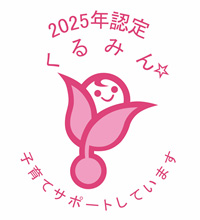
■Efforts to improve employee engagement
We periodically conduct employee satisfaction survey and briefing sessions on annual targets and medium- to long-term vision, with the aim to create a highly productive organization where all employees maximize their abilities to ensure that we provide job satisfaction and improve organizational execution, and to deepen mutual understanding between the corporation and employees.
Employee satisfaction survey(Survey by a third party)
| Item | FY2020 | FY2021 | FY2022 | FY2023 | FY2024 |
|---|---|---|---|---|---|
| Engagement level | 60.8* | 62.8* | 58.4* | 67.4* | 63.7* |
| Number of responses / number of eligible employees |
96/98 | 100/100 | 99/100 | 97/97 | 106/106 |
| Response rate | 98% | 100% | 99% | 100% | 100% |
*The figures are in high level among Japanese companies, and the engagement status is overall good.
■Employee study groups
Younger employees have led voluntary organization of cross-divisional study groups to share information on businesses unique to each division, and on necessary knowledge/skills.

■Support for company circle activities
Financial support is provided to employees for company circle activities.

■New Work Style Project
Since our foundation, we have implemented a series of projects aimed at improving our employees’ work styles and operational efficiency.One such project called “new work style project” was relaunched in October 2021 by interested
employees. Project members met many times to discuss two major issues. One is how existing work styles are failing to accommodate COVID-19 impacts and other social changes. The other is how new work styles can create a virtuous
cycle of higher productivity and efficiency and better private lives. They put forward actions to be taken to management.
Building on this project, we are now exploring how our office should look like after COVID-19. The
aim is “to create ‘an office employees are eager to go to’ while taking advantage of remote work so that at the office they can talk to each other face to face to enhance communication and experience.” In fact, we have already
changed office layouts and adopted a “group address” style (a sectoral, free-address style).


・Diverse work areas (arranging desks and chairs of different designs)
・A system is in place to manage “group address” and “free address.”

・The lounge area is equipped with an automatic specialty coffee server, a soft-drink vending machine, and a freezer that stores breads from a local bakery, which are freely available to employees.
■Reception of a certificate of registration as a Tokyo Sustainable Work Company
Since its foundation, TLC REIT Management has regularly promoted projects on working styles and operational efficiency. Recently, we have declared our commitment to realizing “working styles of the future” under the standards set
out in “Tokyo’s future working style promotion project.” In November 2024, we became the first asset manager of J-REIT to be registered as a Tokyo Sustainable Work Company (Mira Waka).
We will continue to explore and promote
working styles of the future to realize varied and flexible styles of working through proactive effort.

■Participation in "Sustainability Month" events
In November 2024, we organized the “Sustainability Month,” a set of events that allowed employees of the Tokyu Fudosan Holdings Group to experience sustainability and recognize it as a personal problem during the month. These annual events were designed to provide opportunities for them to ponder what they can do to solve social issues in their daily work. Many of our employees participated in the events, including a DE&I chat session, an urban-rural interchange event & marché, a fun environmental workshop for parents and kids, a visit to regenerative architectural facilities, and in-house drives to collect used clothes and other daily goods. During that time, they also made entries to the Sustainable Action Awards, and our initiative “Eco Test certification as a mandatory qualification—Strengthening ESG human resources through the obtainment of Eco Test certificates” was granted the Special Award.
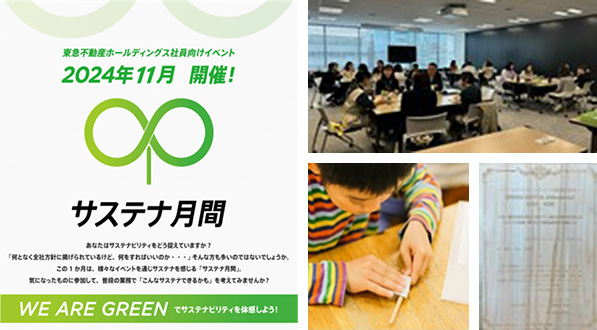
Contribution to the region
■We periodically participate in “town cleaning” sponsored by green bird (specified non-profit corporation).

■In line with our Sustainable Policies and as part of our efforts to contribute to local communities, a shared materiality issue with our partner investment corporations, we have been making donations to local communities
in which three of our asset management clients (investment corporations) have their property assets, utilizing the Regional Revitalization Support Tax System (Corporate version Hometown Tax Donation), a preferential
tax treatment applicable to corporate taxpayers donating to eligible regional revitalization projects.
In fiscal 2025, We donated to Hokkaido’s “ZERO Carbon Hokkaido” initiative (3rd time) (*) and to Sendai
City’s “Project for Promoting Decarbonized Urban Development.” (*Other track record of donations to Hokkaido: FY2020, FY2021, FY2022, each based on the Cheer on the Hokkaido Medical Care!” drive)
Meanwhile,
we have expressed readiness to participate, as a support member, in the “Hokkaido Cheer Network” program designed to bring together people wishing to support Hokkaido in 2023.

Supplier engagement
We recognize the necessity and importance of collaboration with stakeholders in implementing our Sustainability Policy more specifically and ensuring adequate response to environmental and social issues throughout our supply chains in relation to business activities of the Company and the investment corporations entrusted to the Company.
■The Basic Policy on Sustainable Procurement
・We have the Basic Policy on Sustainable Procurement in place concerning business activities throughout our supply chains. This policy is intended to clarify to suppliers our stance that we will take actions in consideration of environmental and social standards and in compliance with relevant laws in procurements and general transactions, including those with property management companies, and to further strengthen efforts through mutual understanding and collaboration with suppliers.
・For certain business partners, we look into their ESG programs and management systems in light of the Basic Policy on Sustainable Procurement, in addition to the annual monitoring evaluation of their management vitality and service quality.
The Basic Policy on Sustainable Procurement (in Japanese) ![]() (PDF:153KB)
(PDF:153KB)
Compliance
We have established the Compliance Department and Compliance Council to ensure compliance.
Compliance Council is the organization that makes deliberation and resolution on conflict of interest, transactions by related parties, internal
compliance and compliance framework.
“We will adhere to the “Tokyu Fudosan Holdings Group Code of Conduct” and implement compliance-based management.”
(Article 2 of Agreement on Tokyu Fudosan Holdings Group Consolidated Operation)
Key points of “Tokyu Fudosan Holdings Group Code of Conduct”
- Ensure compliance with laws and regulations applicable to our business activities.
- As Tokyu Fudosan Holdings Group employee, treat our customers sincerely to maintain their trust.
- Generate a corporate culture that enables frank communication on difficult issues involving work.
- Enhance solidarity of Tokyu Fudosan Holdings Group and promote mutual understanding with stakeholders.
- Enforce proper management of information.
- All employees will understand and focus on ethical conducts and be a reasonable professional.
- Make efforts to create safe workplace and be considerate of the environmental conservation.
■Compliance Committee
(Members)
General Manager of Compliance Department (Chair), representative directors, directors (if consecutively serving as General Manager of the Investment Management Division, cannot attend Council meetings concerning REITs
that the director is not in charge of), and external expert (attorney) on compliance appointed by the board of directors
(Agenda)
The Council shall resolve the following matters.
With respect to (1) to (5), agenda shall be restricted to transactions with related parties and matters deemed necessary by the General Manager of Compliance Department.
- Establishment and amendment of basic investment policy concerning asset management by each REIT
- Determination and change in acquisition or disposal of assets by each REIT and the terms and conditions thereof
- Establishment and amendment of asset management plan by each REIT
- Establishment and amendment of basic policy concerning asset management by each REIT
- Establishment and amendment of basic policy concerning funding, capital policy and dividend policy for each REIT
- Matters related to transactions with related parties (provided, however, excluding transactions defined as not requiring prior approval by the Compliance Council)
- Preparation and amendment of the Compliance Manual and Compliance Program
- Deliberation and resolution on improvement measures concerning inappropriate acts in terms of regulatory compliance and preventative measures, etc.
- Matters for which the General Manager of Compliance Department deems deliberation by the Compliance Council is necessary
■Divisional Compliance Staff
Each year, divisional compliance staff are appointed from each division to perform periodic monitoring on compliance matters. The officers report compliance status in his/her division and share related information.
■Compliance Training
In order to ensure compliance and increase awareness, we provide all officers and employees with compliance training chiefly designed for them to strictly adhere to the compliance basic policy and standards and to learn applicable laws and regulations, etc. Separately, we give such training as part of our orientation training as well.
■Official Policy Against Antisocial Forces
In order to safeguard the propriety of its business activities and ensure that we are able to meet our social responsibilities and fulfill our public mission, the Company abjures dealings of any kind with antisocial forces.
Working
with legal and law enforcement bodies and other third parties, the Company is in a position to respond firmly to all improper demands. The Company’s Compliance Manual and Rules for Responding to Antisocial Forces has established
specific safeguards and procedures for responding to the actions of antisocial forces. The Company also promotes a thorough awareness of these issues among management, employees, and other pertinent parties and provides the training
needed to ensure a specific and appropriate response.
■Prevention of Corruption
Corruption creates significant obstacles against sustainable development and corrodes the social structure. TLC REIT Management recognizes that commitment to prevention of corruption is an important issue for the society and has established
rules on identity confirmation for transaction with customers, etc. in accordance with the Act on Prevention of Transfer of Criminal Proceeds.
Tokyu Fudosan Holdings Corporation is a signatory to the United Nations Global
Compact (UNGC), and as a Group member, the TLC REIT Management supports the ten principles of UNGC. (Principle 10. Businesses should work against corruption in all its forms, including extortion and bribery.)
Please refer
to Tokyu Fudosan Holdings website for details.
■Establishment of whistle-blowing system
We have established the Compliance Helpline Counter as the contact for reporting and consultation on compliance matters including when harassment and bullying is observed, enabling all officers and employees to directly report to the General Manager of the Compliance Department of the Company, General Manager of Legal Affairs Department, Tokyu Land Corporation, General Manager of Group Legal Affairs Department, Tokyu Fudosan Holdings Group, or external attorneys.
| Item | FY2020 | FY2021 | FY2022 | FY2023 | FY2024 |
|---|---|---|---|---|---|
| Awareness of Compliance Helpline Counter | 90% | 88% | 89% | 93% | 92% |
Risk Management
The Company has established a basic policy on risk management based on the strategic targets, as well as risk management rules to implement appropriate management of risks.
Basic Policy on Risk Management
- Based on the above, and in accordance with our management principles, we aim to secure long-term stable revenue and maximize unitholder value by establishing a management system in accordance with these Rules and implementing appropriate risk management against various risks involved with engaging in investment management business.
- Officers and employees, etc., shall recognize the importance of risk management, each be aware that they are the agent of risk management, understand these Rules and internal rules, etc., and strictly comply with the same.
- Risk management shall be executed with necessary and appropriate rules, detailed rules and standards, etc., being established; organizational and resource measures implemented; and responsibilities clarified.
- Necessary and appropriate management and supervision shall be implemented for business outsourcing partners as well as to officers and employees, etc.
- Risk management training, etc., shall be conducted to promote thorough awareness by officers and employees, etc., and to maintain/improve effectiveness of the Basic Policy.
- Basic Policy stated in this Article shall be reviewed periodically or as necessary such as when changes occur to strategic targets.
■Enhancement of risk management framework
The Company engage in enhancement of risk management framework with partial support from external experts.
■Risk Management Training
The Company provides periodic risk management training to all officers and employees with external lecturers.
■ESG-related misconduct
To date, there have been no cases where a legal action such as a fine or punishment has been taken for such acts as violations of laws and regulations related to the environment, labor, industry, or otherwise; briberies and other corruptions; anticompetitive practices; conflicts of interest; or human rights violations. Nor any of our employee have been disciplined or dismissed on such grounds.
Principles for Responsible Investment Signatory
The Principles for Responsible Investment (PRI) refer to the below-listed six principles proposed in 2006 by then secretary general of the United Nations as a guide for members of the financial sector, and the international
network of investors working toward the fulfillment of the principles. PRI is promoted by the United Nations Environment Programme Finance Initiative (“UNEP FI”) and the United Nations Global Compact (“UNGC”).
The PRI,
which calls for incorporating considerations for environmental, social, and governance (ESG) issues into investment decision making, is designed to improve long-term investment performance for beneficiaries and have fiduciaries
to fulfill their duties by having ESG perspectives integrated into the process of investment decision making.
The Company supports the basic idea of the PRI and became a signatory in December 2021.
<Six Principles
for Responsible Investment (PRI)>
1. We will incorporate ESG issues into investment analysis and decision-making processes.
2. We will be active owners and incorporate ESG issues into our ownership policies and
practices.
3. We will seek appropriate disclosure on ESG issues by the entities in which we invest.
4. We will promote acceptance and implementation of the Principles within the investment industry.
5. We will work together
to enhance our effectiveness in implementing the Principles.
6. We will each report on our activities and progress towards implementing the Principles.

In the 2024 assessment report, we received the following Scores.
| Module | Score |
|---|---|
| Policy Governance and Strategy | ★★★★☆ |
| Real estate | ★★★★★ |
| Confidence building measures | ★★★★★ |
GRESB Membership
Considering the need to address the increasing significance of ESG as an asset management company in the investment management industry, the Company became a GRESB Real Estate Company & Fund Manager Member in February 2019.
As a member of a global initiative, we will network and share information with leading companies in the area of ESG and participate in activities such as introduction of Japanese cases to the world, to improve sustainability.
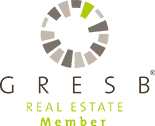
UN Global Compact Signatory
UN Global Compact is a voluntary effort by corporations and organizations to act as a good social citizen by providing responsible and creative leadership and participate in creation of global framework to realize sustainable
growth.
Corporations and organizations that joined UNGC continue their efforts to realize the ten principles regarding protection of human rights, elimination of unfair labor, environmental preservation and prevention of corruption
under commitment and sponsorship by the top management.
Tokyu Fudosan Holdings Corporation has joined the UNGC in December 2016, and as a Group member, the Company supports the ten principles of UNGC.
As a Group
member, we share the Tokyu Fudosan Holdings Group Human Rights Policy, which was announced in January 2020. Based on the brief that it is essential for our business operation and is expected to all companies to respect
the human rights of employees and other stakeholders involved in the Group's business, the Policy expects companies to carry out business activities that support international human rights standards such as the Universal
Declaration of Human Rights and fully respect human rights.

Support for TCFD Recommendations
TCFD refers to the Task Force on Climate-related Financial Disclosures, established by the Financial Stability Board (“FSB”) at the request of G20, to examine how climate-related information should be disclosed and how financial institutions should respond. In January 2022, the Company expressed its support for the recommendations of TCFD, and also joined the TCFD Consortium which is a group of domestic companies that supports TCFD recommendations.


Signatory of Principles for Financial Action for the 21st Century
The "Principles of Financial Behavior for the Formation of a Sustainable Society (the Principles of Financial Behavior in the 21st Century)" is established as an action guideline for financial institutions that want to fulfill the responsibilities and roles necessary for the formation of a sustainable society in October 2011. In February 2023, the Company has become a signatory to the Principles for Financial Action for the 21st Century (PFA21).

Reception of a certificate of registration as a “Tokyo Sustainable Work Company”
The Tokyo Sustainable Work Company Registration Program is a program under which companies committed to realizing sustainable styles of working are registered as “Tokyo Sustainable Work Companies” based on the standards set out in
“Tokyo’s future working style promotion project.”
As a company that has declared its commitment to “working styles of the future,” we were registered as a Tokyo Sustainable Work Company (Mira Waka) in November 2024.
Reception of Kurumin certification
Kurumin certification is offered to companies that have achieved objectives set out in their General Employers Action Plan under the Act on Advancement of Measures to Support Raising Next-Generation Children and have satisfied certain standards. Applicant companies meeting these requirements are certified as “companies with childcare support” (Kurumin certified companies) by the Minister of Health, Labour and Welfare. The Company applied for and obtained Kurumin certification (as of 2025) from the Tokyo Labor Bureau.



